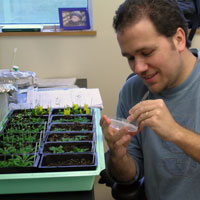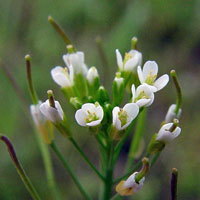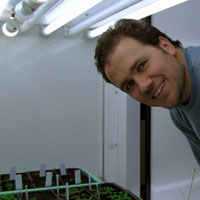
Meet Our Graduate Students
Maximo L. Rivarola
Drawn to UM's Strong Reputation in Plant Biology Research Understanding How Plants Respond to Stress Maximo’s research focuses on understanding the complex ways in which plants respond to a vast array of internal and external cues such as light, toxins, and hormones. He is exploring the ethylene-signaling pathway, which plays an important role in how plants respond by activating gene expression to cope with external stimuli such as a pathogen attack or water stress. This pathway is of critical importance in the agriculture field where ethylene signaling controls the speed at which tomatoes ripen and the maturation of corn. Still, some of the components at work in the pathway are not yet fully understood, and this is where Maximo centers his attention. Deciphering the Precise Role of Genes that the Arabidopsis Plant Shares in Common with Humans Using the Arabidopsis thaliana plant, whose genome is already sequenced and is easy to transform genetically and pollinate, Maximo’s work focuses on two genes, RTE1 and RTH. He is trying to understand the molecular function of RTE1, the REVERSION-TO-ETHYLENE-SENSITIVITY1 (RTE1) gene, which is a regulator of the ethylene hormone receptor ETHYLENE-RECEPTOR1 (ETR1).
To do this, Maximo engineers different alleles in ETR1 and ERS1 (another ethylene receptor) by in-vitro site directed mutagenesis and then transforms RTE1 knockout plants and examines how these plants differs from a wild-type plant. Moreover, he examines ETR1 protein levels in different mutants including rte1 null to determine protein stability. He also performs expression studies, looking at what the expression profiles of RTE1 and RTH are under different conditions. Localization studies have led to the finding that RTE1 co-localizes with ETR1. To characterize the RTE1-HOMOLOG (RTH) gene, Maximo utilizes a knockout of RTH where the gene is engineered to be inoperative, and then grows the plant looking at changes in phenotype. Maximo has been able to present his work in several meetings including one in Shanghai, China and also one in Pisa, Italy where he was invited to give a talk. Visit Dr. Caren Chang's website or the Arabidopsis Thaliana Research Initiative at the University of Maryland (ATRIUM) for more information.
|
[an error occurred while processing this directive]
![]()
| Prospective Graduate Students |
College of Chemical & Life Sciences * University of Maryland * College Park, MD 20742


